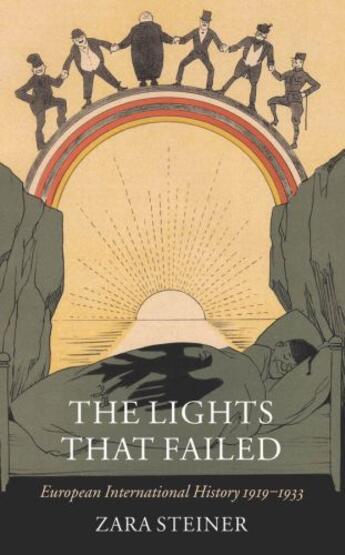-
Nombre de pages : (-)
-
Collection :
(-)
-
Genre :
(-)
-
Thème :
Non attribué
-
Prix littéraire(s) :
(-)
Résumé:
In The Lights that Failed: European International History 1919-1933, part of the Oxford History of Modern Europe series, Steiner challenges the common assumption that the Treaty of Versailles led to the opening of a second European war and provides an analysis of the attempts to reconstruct... Voir plus
In The Lights that Failed: European International History 1919-1933, part of the Oxford History of Modern Europe series, Steiner challenges the common assumption that the Treaty of Versailles led to the opening of a second European war and provides an analysis of the attempts to reconstruct Europe during the 1920s. She examines the efforts that failed but also those which gave hope for future promise that are usually underestimated, if not ignored. She also shows that a degree of stabilization was achieved even though it was fragile, incomplete, and did not last through the 1929-1933 period when nationalist remedies replaced international strategies on both the economic and political levels of European relations. A second volume, The Triumph of the Night, will examine the period from 1934 to 1941. - ;The peace treaties represented an almost impossible attempt to solve the problems caused by a murderous world war. In The Lights that Failed: European International History 1919-1933, part of the Oxford History of Modern Europe series, Steiner challenges the common assumption that the Treaty of Versailles led to the opening of a second European war. In a radically original way, this book characterizes the 1920s not as a frustrated prelude to a second global conflict but as a fascinating decade in its own right, when politicians and diplomats strove to re-assemble a viable European order. Steiner examines the efforts that failed but also those which gave hope for future promise, many of which are usually underestimated, if not ignored. She shows that an equilibrium was achieved, attained between a partial American withdrawal from Europe and the self-imposed constraints which the Soviet system imposed on exporting revolution. The stabilization painfully achieved in Europe reached it fragile limits after 1925, even prior to the financial crises that engulfed the continent. The hinge years between the great crash of 1929 and Hitler's achievement of power in 1933 devastatingly altered the balance between nationalism and internationalism. This wide-ranging study helps us grasp the decisive stages in this process.
In a second volume, The Triumph of the Night , Steiner will examine the immediate lead up to the Second World War and its early years. - ;...indisputably the most detailed and authoritative single-volume account of European international history in the fifteen years following the end of the Frist World War...[this work] affirms Zara Steiner's status as the pre-eminent historian of inter-war international affairs. - Martin Conway, EHR 494;Zara Steiner has produced a splendid volume, chock full of detail and with many thought-provoking insights. It will remain a classic for many years to come. For those studying international business history it will serve as an excellent background reference manual to the period... If one were to ask for more it would be the second volume in the same vein. - Derek H. Aldcroft, Business History;Zara Steiner's work has ensured that we will have to treat that neglected decade [the 1920s] with proper respect. She has told the story with impeccable scholarship, clarity and compassion ... Her book will rightly become the definitive work on the period. - Margaret MacMillan, TLS;... impressive - David Stevenson, LRB;...majestic and authoritative volume...The Lights that Failed skillfully and judiciously deploys the fruits of extensive reading and long reflection ... Embedded in its comprehensive survey of the main protagonists and themes is a radical and fascinating argument... - Mark Mazower, BBC History;Any reader who wants to understand the inter-War period should consult this book and any serious student of the period should buy it. For there is simply nothing to compare with it in terms of erudition or exposition. Above all Zara Steiner ensures that we read history forward not backward. - The Independent;a dazzling account...This combination of human drama and a broad international perspective, shifting between western, eastern and Atlantic viewpoints, is a governing strength of the narrati
Donner votre avis














